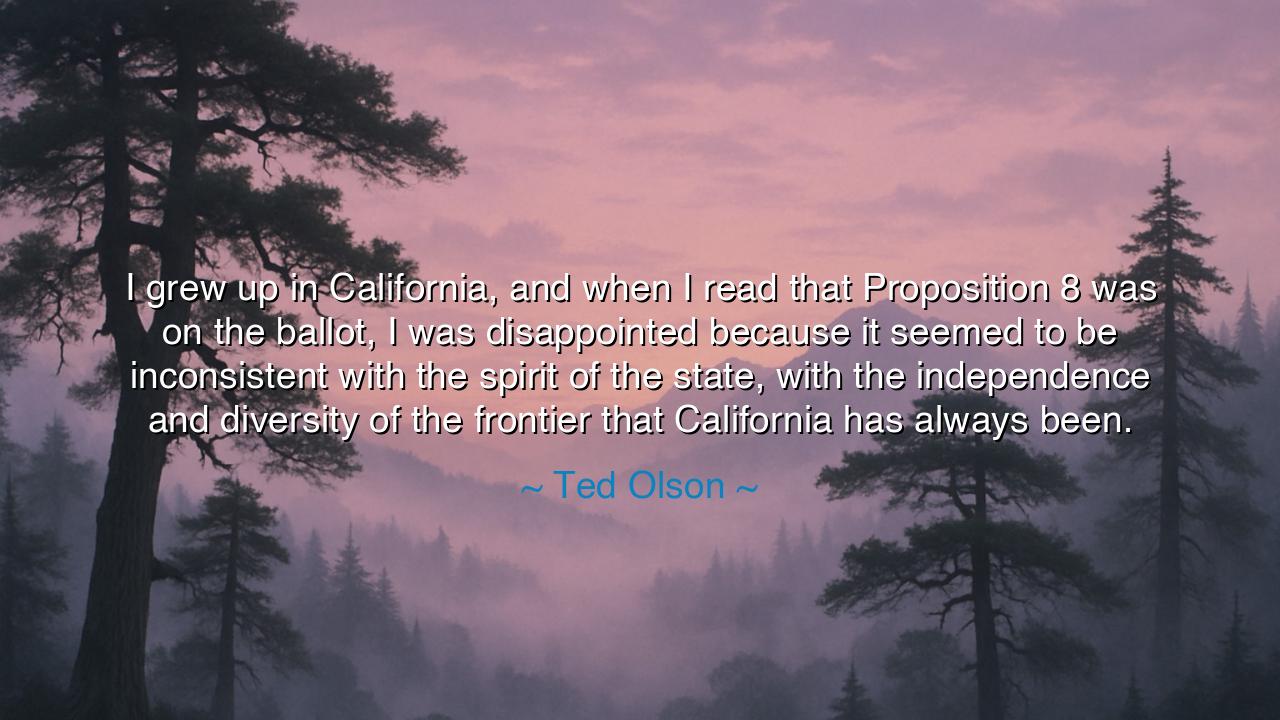
I grew up in California, and when I read that Proposition 8 was
I grew up in California, and when I read that Proposition 8 was on the ballot, I was disappointed because it seemed to be inconsistent with the spirit of the state, with the independence and diversity of the frontier that California has always been.






Hear the thoughtful and courageous words of Ted Olson, a man once known for his devotion to law and liberty, who declared: “I grew up in California, and when I read that Proposition 8 was on the ballot, I was disappointed because it seemed to be inconsistent with the spirit of the state, with the independence and diversity of the frontier that California has always been.” These are not merely the words of political opinion, but of moral reflection — the cry of a heart that sees injustice where freedom once flourished, and contradiction where courage once reigned. In them we hear the voice of one who remembers the true spirit of a place — not the laws it writes, but the ideals it embodies.
The origin of this quote lies in the great civil struggle over Proposition 8, a 2008 ballot measure in California that sought to ban same-sex marriage after the state’s Supreme Court had declared it a constitutional right. For many, it was a contest of belief; for Olson, it was a test of principle. Though he was a lifelong conservative and once served as Solicitor General of the United States, Olson looked upon the issue not through the narrow lens of politics, but through the eternal eye of justice. He saw that to deny any citizen the right to love and marry freely was to betray the very independence that California had long symbolized — the frontier land where new beginnings, diversity, and defiance of old limits had always been its beating heart.
To understand his disappointment, one must recall what California has represented since its birth. It was the land of seekers — of gold miners and dreamers, of inventors and outcasts who refused to live within the walls that other civilizations built around them. It was the frontier, both physical and spiritual, where difference was not shunned but celebrated, and where diversity was the source of its strength. The pioneers who crossed deserts and mountains to reach its shores did so in the spirit of freedom — not to bind others, but to live unbound themselves. Olson’s sorrow, therefore, was not only political; it was deeply historical. He mourned a betrayal of California’s soul, the silencing of that boundless independence that had once defined it.
The ancients, too, understood that every land and people has its own genius loci — its spirit, its invisible guardian of character. When a nation acts contrary to that spirit, it sickens from within. Olson’s California, the land of sunlight and innovation, of equality and boldness, seemed for a moment to forget itself. By yielding to fear and exclusion, it turned its back on the very frontier spirit that made it a beacon for all who were different or daring. Just as Athens fell when it betrayed its democracy, or Rome when it enslaved those it once freed, so too does any society falter when it denies liberty in the name of order.
Olson’s words are thus both lament and challenge. For he reminds us that independence is not a matter of geography, but of conscience. True freedom does not consist merely in breaking from kings or empires — it lives in the refusal to let prejudice rule the heart. California, in his memory, was not simply a place, but a promise: that all who come with hope and courage might find belonging. To deny marriage, or any human right, to a class of people was to break that promise — to betray the sacred diversity that gives civilization its vitality.
Consider the irony that Ted Olson, who had once stood before the Supreme Court defending conservative causes, would now stand beside David Boies, his former opponent in the Bush v. Gore case, to challenge Proposition 8. Together, they fought for the freedom to love, proving that principle transcends party, and that the true warrior of liberty must sometimes defy his own tribe. In their union — one conservative, one liberal — the very spirit of California’s diversity was reborn. And when, in 2013, the Supreme Court struck down the ban, it was as though the frontier had spoken again: freedom, though delayed, would not be denied.
So let this be the teaching: that every generation must guard the spirit of its own independence, lest it be eroded by fear or fashion. Laws can be written and rewritten, but the heart of a people — its moral courage, its love of diversity — must be tended like a fire. Let each of us remember what Olson remembered: that to honor one’s homeland is not to defend its past, but to live its ideals in the present. And when injustice rises, let us speak, not in anger, but in the voice of remembrance — reminding the world, as he did, that the true frontier is not a place on the map, but the ever-expanding territory of the human spirit.
Thus, my children, take this lesson to heart: do not let your independence be defined by the freedom you claim, but by the freedom you grant. For the spirit of every land, every age, and every soul is kept alive not by walls, but by the courage to include. And as long as we cherish that courage, as long as we uphold the sacred bond between diversity and liberty, the frontier — that eternal symbol of possibility — will never close.






AAdministratorAdministrator
Welcome, honored guests. Please leave a comment, we will respond soon